Enrile urges anti-RH groups to question birth control law before SC

Senate President Juan Ponce Enrile. INQUIRER FILE PHOTO
MANILA, Philippines—Senate President Juan Ponce Enrile urged parties against the newly signed Responsible Parenthood and Reproductive Health (RH) Act (RA 10354) to simply ask the Supreme Court to uphold the constitutional provision requiring the state to protect the life of the mother and her unborn child from the moment of conception.
A favorable decision means it would be illegal for the government to distribute via health centers and public hospitals all forms of artificial birth control methods that bar a fertilized egg cell from attaching itself to the mother’s uterus.
“Anything that affects that life from the moment it comes into being, that would be unconstitutional,” Enrile explained in a radio interview on Sunday.
The Senate President was referring to Section 12 of Article II of the Constitiution that provides: “The State recognizes the sanctity of family life and shall protect and strengthen the family as a basic autonomous and social institution.”
The provision adds that the State “shall equally protect the life of the mother and the life of the unborn from conception.”
“Any law can be challenged before the Supreme Court. Not only the RH law but any bill that becomes law like the sin tax measure. It’s possible on any given issue. A taxpayer who will be affected by a provision … can elevate the case before the Supreme Court and challenge its constitutionality,” Enrile said.
The Senate President’s suggestion comes at the heels of warnings aired by anti-RH legislators and religious leaders against the law that they would question its constitutionality before the tribunal.
Asked whether the provision he mentioned would be enough for the Supreme Court to shoot down the RH law, Enrile replied: “Siyempre! The State cannot go beyond what the Constitution allows…Otherwise, it would be exercising unbridled power.”
When the Senate was still deep in debates over the RH bill, Enrile and other senators against the measure insisted that life begins during conception when egg cell and sperm cell meet and result in a fertilized egg.
Other senators however, toyed with the idea that life could begin during “implantation” when the fertilized egg finally attaches itself to the womb and begins to take nourishment from the mother.
The issue was tackled several times but never resolved.
“I told them time and again when we were still debating in plenary that ultimately, it would be the Supreme Court that would serve as the final decider and arbiter of this issue,” Enrile recalled.
He added that during the discussions of the Constutitional Commission that drafted the Charter proposed in 1986, “the term used (to refer to life) was ‘from the moment of conception.’ There is a point in time when conception occurs. So that you can determine when protection of (that life by) the state must begin.”
Enrile said there was a “gap” between the period of conception and implantation when “there is already life that could die” if barred from attaching itself to the womb.
“But the final interpreter of this argument would be the Supreme Court, no one else. Not the President nor Congress. Only the Supreme Court as the Supreme Court. Not a single justice but the Supreme Court of the country,” he stressed.
Enrile said he wished the tribunal would rule immediately on the matter and noted that a decision “would be one of most monumental issues to come before the Supreme Court” as RH has gone beyond being a simple health issue.
“It has become a political and moral issue. And the divisions it has created have become so deep that it would take time for all these to heal,” he said.
Enrile took note for example, of warnings given by religious leaders they would campaign against lawmakers who voted in favor of the RH bill when it was still pending in the Senate and the House of Representatives.
Still, the Senate President said it was only prudent for Malacañang to avoid “fanfare” when President Aquino signed the RH bill into law on Dec. 21.
He said Mr. Aquino’s move to sign the bill without calling attention to it depended on the President’s full discretion.
“We have to respect his right to do that. I do not know the reason why he signed it without any ceremonial, without fuss so we leave it to (the President’s) judgment. I think he also did not want to become a further source of discord because as I said, this issue has already created deep fissures among us.
Still, Enrile said he would attend a ceremonial signing of the RH law in Malacañang should this be decided upon by the President.
“I will go because doing so is a fulfillment of my job as Senate President. Even if I am against it. Besides, there is no bill that can be relayed from the Senate to Malacañang without my signature as the chamber’s chief. I signed the RH bill as Senate President. That is a constitutional requirement.














